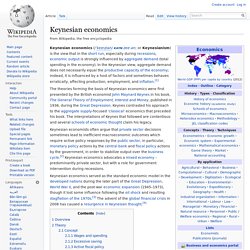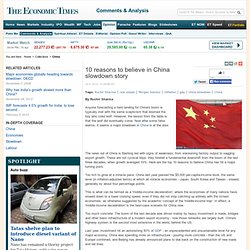

Macroeconomics. Circulation in macroeconomics.

Macroeconomics (from the Greek prefix makro- meaning "large" and economics) is a branch of economics dealing with the performance, structure, behavior, and decision-making of an economy as a whole, rather than individual markets. This includes national, regional, and global economies.[1][2] With microeconomics, macroeconomics is one of the two most general fields in economics. While macroeconomics is a broad field of study, there are two areas of research that are emblematic of the discipline: the attempt to understand the causes and consequences of short-run fluctuations in national income (the business cycle), and the attempt to understand the determinants of long-run economic growth (increases in national income). Keynesian economics. The theories forming the basis of Keynesian economics were first presented by the British economist John Maynard Keynes in his book, The General Theory of Employment, Interest and Money, published in 1936, during the Great Depression.

Keynes contrasted his approach to the aggregate supply-focused 'classical' economics that preceded his book. The interpretations of Keynes that followed are contentious and several schools of economic thought claim his legacy. Bretton Woods system. The Bretton Woods system of monetary management established the rules for commercial and financial relations among the world's major industrial states in the mid-20th century.

The Bretton Woods system was the first example of a fully negotiated monetary order intended to govern monetary relations among independent nation-states. The chief features of the Bretton Woods system were an obligation for each country to adopt a monetary policy that maintained the exchange rate by tying its currency to gold and the ability of the IMF to bridge temporary imbalances of payments. Also, there was a need to address the lack of cooperation among other countries and to prevent competitive devaluation of the currencies as well. 10 reasons to believe in China slowdown story. Jul 9, 2012, 10.06AM IST By Ruchir Sharma Anyone forecasting a hard landing for China's boom is typically met with the same scepticism that doomed the boy who cried wolf.

Euro crisis.